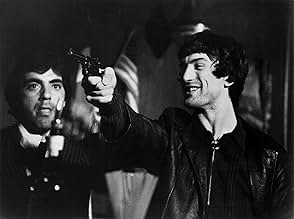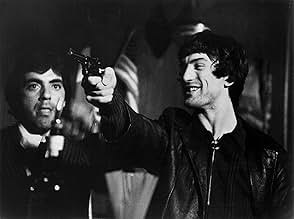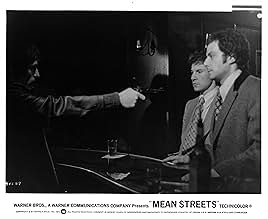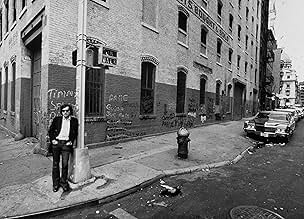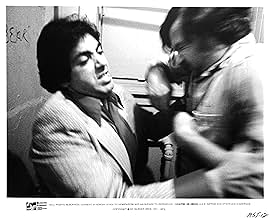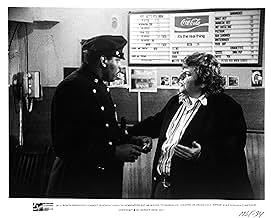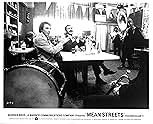Un petit truand aspire à gravir les échelons de la mafia locale.Un petit truand aspire à gravir les échelons de la mafia locale.Un petit truand aspire à gravir les échelons de la mafia locale.
- Réalisation
- Scénario
- Casting principal
- Récompenses
- 5 victoires et 5 nominations au total
Victor Argo
- Mario
- (as Vic Argo, Victor Argo)
Murray Moston
- Oscar
- (as Murray Mosten)
Avis à la une
Martin Scorsese has made some brilliant movies in his life, but unfortunately this isn't one of them. I can't really call it bad, because the direction and the cinematography just drip with pure talent, but I have some major problems with the plot. Mainly, where the hell is it? The story doesn't just move at a slow pace, it appears to go in incredibly tiring loops. It starts of with Johnny Boy (a solid Robert DeNiro) owing a whole bunch of crooks money, which is a pretty riveting starting point. What does he do about it? What do the crooks do about it? Nothing, and that goes on for two hours. The whole movie appears to be Harvey Keitel endlessly saying he has to pay his debts, to which he refuses, to which he asks it again half an hour later, to which he like, makes up an excuse and goes to the movies, and all of it feels so redundant. The movie finally gets to the point in the end, but that doesn't really save it. It shows the sadness of the bad neighbourhoods in New York wonderfully, but that's really all I can say about it.
'Mean Streets', the earliest Scorsese film people have heard of, is the result of an on-form film maker, telling a personal story.
One thing to immediately note about 'Mean Streets' is the performance of our two leads, Harvey Keitel and Robert De Niro, both looking young and are full of energy. They deliver the goods, big time. They are both so watchable and make up at least half of the movie's appeal. In fact, 'Mean Streets' is an inherently watchable movie overall, helped by some fine dialogue and Scorsese's trademark energetic and involving camera-work. The main draw is the antics of the characters and their relationships rather than a high-stakes narrative. Dramatic things happen but don't relate intrinsically to the central plot: that of De Niro's character Johnny Boy, his debts to clubs, bars and old pals along with his long-suffering buddy Charlie (Keitel).
In comparison to other Scorsese films (which is inevitably going to happen if this is not your first Scorsese), it is very low on scale and as mentioned before, low on stakes. This is no gangster epic or psychological portrait but simply a 2 hour window into the streets of New York. It is certainly worth watching.
One thing to immediately note about 'Mean Streets' is the performance of our two leads, Harvey Keitel and Robert De Niro, both looking young and are full of energy. They deliver the goods, big time. They are both so watchable and make up at least half of the movie's appeal. In fact, 'Mean Streets' is an inherently watchable movie overall, helped by some fine dialogue and Scorsese's trademark energetic and involving camera-work. The main draw is the antics of the characters and their relationships rather than a high-stakes narrative. Dramatic things happen but don't relate intrinsically to the central plot: that of De Niro's character Johnny Boy, his debts to clubs, bars and old pals along with his long-suffering buddy Charlie (Keitel).
In comparison to other Scorsese films (which is inevitably going to happen if this is not your first Scorsese), it is very low on scale and as mentioned before, low on stakes. This is no gangster epic or psychological portrait but simply a 2 hour window into the streets of New York. It is certainly worth watching.
I was never clear at just why Harvey Keitel was putting himself out on a limb for Robert DeNiro in Mean Streets. Sure he's taken with DeNiro's cousin Amy Robinson still I'm not sure he was worth the effort.
Keitel is a small time hood in Manhattan's Little Italy who's not really into it. DeNiro is another small time hood but he's completely and psychotically out of control. He's borrowed a few grand from local loan shark Robert Romanus and Romanus wants his money. Now during the climax scene DeNiro does ask a relevant question, why after he has borrowed and stiffed everyone in the neighborhood would you lend him any money?
In fact Keitel is all that's standing between DeNiro and gangster retribution. Is it all worth it even for Amy Robinson who is an epileptic and for some reason Keitel's uncle Cesare Danova thinks that disqualifies her as a potential bride.
The story is a bit muddled but the characters especially Keitel and DeNiro are unforgettable. Mean Streets made the career of both of them and of director Martin Scorsese. Keitel has become a valued character player and DeNiro a star with an astonishing variety of roles. In fact next to John Ford/John Wayne, Martin Scorsese/Robert DeNiro is probably the most successful director/player combination in film history.
This must have been a labor of love since Martin Scorsese grew up in Little Italy grown a lot smaller since he was a kid there. No doubt Keitel, DeNiro and the rest are drawn from characters he knew. His mom Catherine Scorsese also makes an appearance as she does in many of her son's works.
I don't think Mean Streets ranks up there with Casino, The Departed, The Aviator and Goodfellas, but it's an interesting work.
Keitel is a small time hood in Manhattan's Little Italy who's not really into it. DeNiro is another small time hood but he's completely and psychotically out of control. He's borrowed a few grand from local loan shark Robert Romanus and Romanus wants his money. Now during the climax scene DeNiro does ask a relevant question, why after he has borrowed and stiffed everyone in the neighborhood would you lend him any money?
In fact Keitel is all that's standing between DeNiro and gangster retribution. Is it all worth it even for Amy Robinson who is an epileptic and for some reason Keitel's uncle Cesare Danova thinks that disqualifies her as a potential bride.
The story is a bit muddled but the characters especially Keitel and DeNiro are unforgettable. Mean Streets made the career of both of them and of director Martin Scorsese. Keitel has become a valued character player and DeNiro a star with an astonishing variety of roles. In fact next to John Ford/John Wayne, Martin Scorsese/Robert DeNiro is probably the most successful director/player combination in film history.
This must have been a labor of love since Martin Scorsese grew up in Little Italy grown a lot smaller since he was a kid there. No doubt Keitel, DeNiro and the rest are drawn from characters he knew. His mom Catherine Scorsese also makes an appearance as she does in many of her son's works.
I don't think Mean Streets ranks up there with Casino, The Departed, The Aviator and Goodfellas, but it's an interesting work.
Mean Streets has all the characteristics we have come to associate with Scorsese - the fluid camerawork, the expressionistic lighting, the sudden explosions of violence, the eclectic soundtrack. In later films, he took cinema to new heights with the flowering of his technical skills and the broadening of his material, but Mean Streets remains unsurpassed for the emotional intensity which only a young director, passionate about film and intent on making a personal statement, could achieve.
The theme of the film is contained in the famous first line 'You don't make up for your sins in church; you do it in the streets' (a Scorsese voice-over). An extended preface which delineates the nature of the film and its characters before the narrative begins includes brief cameo scenes introducing the four protagonists (a much copied device: see, for example, Trainspotting).
Scorsese's alter-ego is played as in the earlier 'Who's That Knocking At My Door?' by Harvey Keitel, giving the performance of his young life. He is Charlie, a junior member of a Mafia family who collects debts and runs numbers, but who also has aspirations to sainthood. The other key figure is his anarchic friend, Johnny Boy, played with ferocious energy by de Niro.
Charlie is introduced coming out of confession, dissatisfied with his penance. Reciting words doesn't mean anything to him and he can't believe that forgiveness could come so easily. Deliberately burning his hand in a candle flame is a more effective reminder of the pain of hell. The camera follows Charlie from the altar into Tony's bar, a red-lit inferno, and when Johnny Boy comes in, to the tune of Jumping Jack Flash, Charlie recognises that this is the form his penance will take. Johnny Boy is the cross he must bear. 'You send me this, Lord' he says resignedly.
Johnny Boy's irresponsibility and impulsiveness make him everything Charlie, with his controlled, anxious, guilt-ridden persona, is not. The argument which follows in the back room about Johnny Boy's debts deserves its reputation as one of the great scenes in seventies cinema.
Charlie's life moves in well worn, claustrophobic circles. Hardly anyone outside his immediate circle appears in the film and other ethnic groups are viewed with suspicion. The characters seldom appear outdoors or in daylight. Charlie inhabits a world of bars, pool halls and cinemas. In the one scene he appears in sunlight, he looks ill at ease. The suit and heavy overcoat he wears (reflecting his Mafiosi ambitions) look distinctly out of place on a beach. It's significant that in this scene Teresa, his girlfriend, scorns his small-time gangsterism and challenges him to join her in moving away to a new life. But Charlie is trapped by his desire to please his uncle.
Scorsese has said that his choice in adolescence lay between becoming a priest and becoming a gangster and that he failed on both counts. Mean Streets allows him to explore that choice to devastating effect.
The theme of the film is contained in the famous first line 'You don't make up for your sins in church; you do it in the streets' (a Scorsese voice-over). An extended preface which delineates the nature of the film and its characters before the narrative begins includes brief cameo scenes introducing the four protagonists (a much copied device: see, for example, Trainspotting).
Scorsese's alter-ego is played as in the earlier 'Who's That Knocking At My Door?' by Harvey Keitel, giving the performance of his young life. He is Charlie, a junior member of a Mafia family who collects debts and runs numbers, but who also has aspirations to sainthood. The other key figure is his anarchic friend, Johnny Boy, played with ferocious energy by de Niro.
Charlie is introduced coming out of confession, dissatisfied with his penance. Reciting words doesn't mean anything to him and he can't believe that forgiveness could come so easily. Deliberately burning his hand in a candle flame is a more effective reminder of the pain of hell. The camera follows Charlie from the altar into Tony's bar, a red-lit inferno, and when Johnny Boy comes in, to the tune of Jumping Jack Flash, Charlie recognises that this is the form his penance will take. Johnny Boy is the cross he must bear. 'You send me this, Lord' he says resignedly.
Johnny Boy's irresponsibility and impulsiveness make him everything Charlie, with his controlled, anxious, guilt-ridden persona, is not. The argument which follows in the back room about Johnny Boy's debts deserves its reputation as one of the great scenes in seventies cinema.
Charlie's life moves in well worn, claustrophobic circles. Hardly anyone outside his immediate circle appears in the film and other ethnic groups are viewed with suspicion. The characters seldom appear outdoors or in daylight. Charlie inhabits a world of bars, pool halls and cinemas. In the one scene he appears in sunlight, he looks ill at ease. The suit and heavy overcoat he wears (reflecting his Mafiosi ambitions) look distinctly out of place on a beach. It's significant that in this scene Teresa, his girlfriend, scorns his small-time gangsterism and challenges him to join her in moving away to a new life. But Charlie is trapped by his desire to please his uncle.
Scorsese has said that his choice in adolescence lay between becoming a priest and becoming a gangster and that he failed on both counts. Mean Streets allows him to explore that choice to devastating effect.
Scorsese's first film, the interesting catastrophe "Boxcar Bertha," marked his birth as a director, but it was with his second feature, "Mean Streets" that we witnessed the birth of an artist. Most of "Mean Streets" is slightly unfocused with a simplistic plot based around a lot of machismo grandstanding and long bouts of boring dialog (occasionally made interesting by DeNiro's off-kilter star-making turn as Johnny-Boy), with spats of visceral violence (far less gory here than in later Scorcese pics), and a visual bravado that seems slightly less disciplined but no less entertaining than your standard Scorsese crime flick.
Despite its drawbacks (mainly due to youth and inexperience), the template was set. The opening credits (done to the tune of "Be My Baby") suck you right into the film, and the rest of the movie is peppered with Scorsese's loving treatment of popular music that would later become one of his most endearing hallmarks. The basic premise featuring Harvey Keitel as Charlie (the young hood with a heart of gold and conflicted internally by the religion of the Church and the religion of the Streets), Robert DeNiro as Johnny-Boy (the equally loved and hated loose-canon brother figure), and Amy Robinson as Theresa (the woman our hero wants to put on a pedestal as a saint but often treats like a whore), is a trifecta of archetypes we see repeated again and again in Scorsese's films (most obviously in "Casino" with the DeNiro-Pesci-Stone characters, and most subversively in "The Last Temptation of Christ" with Jesus-Judas-Mary Magdalene). The religious iconography, the brotherhood of crooks, the attraction to the gangster lifestyle, the keen eye for depicting violence in artistic and startling ways...these are displayed here in "Mean Streets" in their rawest form.
Though flawed in many ways, "Mean Streets" set the stage and laid the the template for the type of film Scorsese would perfect seventeen years later with "Goodfellas." This heralded the arrival of a new talent and a new genre, and the world of film has thankfully never been the same.
Despite its drawbacks (mainly due to youth and inexperience), the template was set. The opening credits (done to the tune of "Be My Baby") suck you right into the film, and the rest of the movie is peppered with Scorsese's loving treatment of popular music that would later become one of his most endearing hallmarks. The basic premise featuring Harvey Keitel as Charlie (the young hood with a heart of gold and conflicted internally by the religion of the Church and the religion of the Streets), Robert DeNiro as Johnny-Boy (the equally loved and hated loose-canon brother figure), and Amy Robinson as Theresa (the woman our hero wants to put on a pedestal as a saint but often treats like a whore), is a trifecta of archetypes we see repeated again and again in Scorsese's films (most obviously in "Casino" with the DeNiro-Pesci-Stone characters, and most subversively in "The Last Temptation of Christ" with Jesus-Judas-Mary Magdalene). The religious iconography, the brotherhood of crooks, the attraction to the gangster lifestyle, the keen eye for depicting violence in artistic and startling ways...these are displayed here in "Mean Streets" in their rawest form.
Though flawed in many ways, "Mean Streets" set the stage and laid the the template for the type of film Scorsese would perfect seventeen years later with "Goodfellas." This heralded the arrival of a new talent and a new genre, and the world of film has thankfully never been the same.
What Scorsese Film Ranks Highest on IMDb?
What Scorsese Film Ranks Highest on IMDb?
Cinema legend Martin Scorsese has directed some of the most acclaimed films of all time. See how IMDb users rank all of his feature films as director.
Le saviez-vous
- AnecdotesFrancis Ford Coppola contributed money to the budget of the film. However, it is rumored that he lent Martin Scorsese $3000 as the Mafia shook him down for using the San Genaro Festival as a backdrop without "permission". It's generally presumed the Mafia uses the all-cash festival to launder money from their ill-gotten gains.
- GaffesYou can see Robert De Niro's mic pack on his back when he gets up to walk to the window at Charlie's house after staying the night.
- Citations
[first lines]
Voice in Charlie's Mind: You don't make up for your sins in church. You do it in the streets. You do it at home. The rest is bullshit, and you know it.
- Versions alternativesNBC edited 10 minutes from this film for its 1977 network television premiere.
- ConnexionsEdited into American Cinema: Film Noir (1995)
- Bandes originalesJumpin' Jack Flash
Written by Mick Jagger (as M. Jagger), Keith Richards (as K. Richards) (uncredited)
By The Rolling Stones
Courtesy of ABKCO Records
Meilleurs choix
Connectez-vous pour évaluer et suivre la liste de favoris afin de recevoir des recommandations personnalisées
- How long is Mean Streets?Alimenté par Alexa
Détails
- Date de sortie
- Pays d’origine
- Site officiel
- Langues
- Aussi connu sous le nom de
- Mean streets - les rues chaudes
- Lieux de tournage
- Sociétés de production
- Voir plus de crédits d'entreprise sur IMDbPro
Box-office
- Budget
- 500 000 $US (estimé)
- Montant brut aux États-Unis et au Canada
- 32 645 $US
- Week-end de sortie aux États-Unis et au Canada
- 32 645 $US
- 15 mars 1998
- Montant brut mondial
- 61 676 $US
- Durée1 heure 52 minutes
- Couleur
- Rapport de forme
- 1.85 : 1
Contribuer à cette page
Suggérer une modification ou ajouter du contenu manquant






